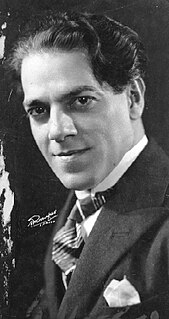The Bachianas Brasileiras are a series of nine suites by the Brazilian composer Heitor Villa-Lobos, written for various combinations of instruments and voices between 1930 and 1945. They represent a fusion of Brazilian folk and popular music on the one hand and the style of Johann Sebastian Bach on the other, as an attempt to freely adapt a number of Baroque harmonic and contrapuntal procedures to Brazilian music. Most of the movements in each suite have two titles: one "Bachian", the other Brazilian.

Chôros No. 11 is a work for piano and orchestra written in 1928 by the Brazilian composer Heitor Villa-Lobos. It is part of a series of fourteen numbered compositions collectively titled Chôros, ranging from solos for guitar and for piano up to works scored for soloist or chorus with orchestra or multiple orchestras. Chôros No. 11 is the longest in the series, a performance lasting over an hour.

Chôros No. 12 is an orchestral work written between 1925 and 1945 by the Brazilian composer Heitor Villa-Lobos. It is part of a series of fourteen numbered compositions collectively titled Chôros, ranging from solos for guitar and for piano up to works scored for soloist or chorus with orchestra or multiple orchestras, and in duration up to over an hour. Chôros No. 12 is one of the longest compositions in the series, a performance lasting about 35 minutes.

Chôros No. 9 is an orchestral work written between 1929 and 1942 by the Brazilian composer Heitor Villa-Lobos. It is part of a series of fourteen numbered compositions collectively titled Chôros, ranging from solos for guitar and for piano up to works scored for soloist or chorus with orchestra or multiple orchestras, and in duration up to over an hour. A recorded performance of Chôros No. 9 made by the composer lasts almost 28 minutes.

Chôros No. 8 is a work for orchestra and two pianos, written in 1925 by the Brazilian composer Heitor Villa-Lobos. It is part of a series of fourteen numbered compositions collectively titled Chôros, ranging from solos for guitar and for piano up to works scored for soloist or chorus with orchestra or multiple orchestras, and in duration up to over an hour. A recording of Chôros No. 8 conducted by the composer lasts 22 minutes.

Symphony No. 1O Imprevisto is a composition by the Brazilian composer Heitor Villa-Lobos, written in 1916. A performance lasts about twenty-five minutes.

Symphony No. 2, Ascensão (Ascension) is a composition by the Brazilian composer Heitor Villa-Lobos, written between 1917 and 1944.

Symphony No. 3 is a composition by the Brazilian composer Heitor Villa-Lobos, written in 1919. A performance lasts about 35 minutes.

Symphony No. 4, "A Vitória" (Victory) is a composition by the Brazilian composer Heitor Villa-Lobos, written in 1919. A recording conducted by the composer lasts just over thirty minutes.

Symphony No. 5, A Paz (Peace) is a composition by the Brazilian composer Heitor Villa-Lobos, written in 1920. The score has been lost.

Symphony No. 6Sobre a linha das montanhas do Brasil is a composition by the Brazilian composer Heitor Villa-Lobos, written in 1944. It lasts about twenty-five minutes in performance.

Symphony No. 7, Odisséia da paz is a composition by the Brazilian composer Heitor Villa-Lobos, written in 1945. A performance lasts about 30 minutes.

Symphony No. 8 is a composition by the Brazilian composer Heitor Villa-Lobos, written in 1950. A performance lasts about 25 minutes

Symphony No. 10, Sumé pater patrium: Sinfonia ameríndia com coros (Oratorio) is a composition by the Brazilian composer Heitor Villa-Lobos, written in 1952–53. The broadcast performance of the world-premiere performance under the composer's direction lasts just over 67 minutes.

Symphony No. 11 is a composition by the Brazilian composer Heitor Villa-Lobos, written in 1955. A performance lasts about twenty-five minutes.

Symphony No. 12 is a composition by the Brazilian composer Heitor Villa-Lobos, written in 1957. A performance lasts about twenty-five minutes.

Nonet, subtitled "Impressão rápida de todo o Brasil" is a chamber-music work by the Brazilian composer Heitor Villa-Lobos, written in 1923. It is number W191 in the catalogue of works compiled by David Appleby.

Uirapuru is a symphonic poem or ballet by the Brazilian composer Heitor Villa-Lobos, begun as a revision of an earlier work in 1917 and completed in 1934. A recording conducted by the composer lasts 20 minutes and 33 seconds.

The Piano Concerto No. 4, W505, is a composition for piano and orchestra by the Brazilian composer Heitor Villa-Lobos, written in 1952. A performance lasts about 27 minutes.

The Piano Concerto No. 3, W512, is a composition for piano and orchestra by the Brazilian composer Heitor Villa-Lobos, written in 1952–57. A performance lasts about 26 minutes.


